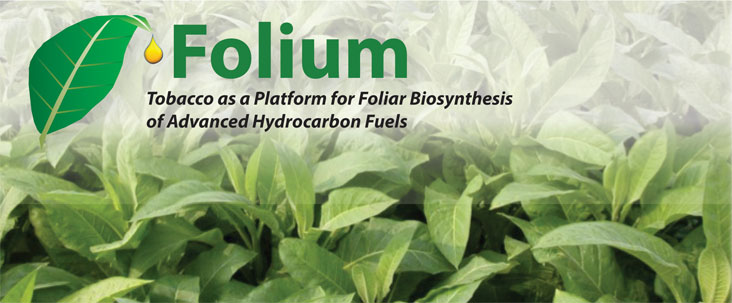Background
The advanced FOLIUM concept of a direct photosynthesis-to-fuels approach is a shortcut in the process of renewable fuel generation from solar energy.
FOLIUM is an ARPA-E PETRO project aiming at introducing effective fuel synthesis pathways in tobacco to generate high-energy fuels that can compete economically with existing fuel production systems. Energy capture from the sun by tobacco leaves and stems will convert atmospheric carbon dioxide into hydrocarbons, that are suitable for use as drop-in fuels, with minimal additional processing.
FOLIUM researchers will introduce genetic pathways for enhanced energy capture, carbon dioxide (CO2) uptake and fuel production. They will study metabolic flux to identify bottlenecks in pathways that lead to oil production, to enable i
mproved strategies to increase oil production. The introduced pathways will confer on tobacco the ability for direct photosynthetic conversion of carbon dioxide into high-density liquid biofuel components and establish tobacco as an advanced bioenergy crop.
Direct photosynthetic conversion of atmospheric CO2 into energy-dense, liquid biofuels will transform tobacco leaves and stems into fuel-generating factories. Tobacco-generated biofuels, such as alkanes and terpenoids, will be used as ready-made biodiesel sources, or can be further processed and converted into jet-fuel and bio-gasoline blends.
The FOLIUM approach offers significant advantages over existing biofuel technologies.
For example, compared with microbial fermentation of sugars-to-fuels, the FOLIUM technology allows for the direct conversion of atmospheric CO2 into drop-in fuels, entirely bypassing costly biomass deconstruction and processing that are required for lignocellulosic and algal feedstocks. The FOLIUM approach also avoids shortcomings associated with biodiesel production via the transesterification process.
Tobacco offers several intriguing advantages for production of biofuels. Tobacco produces high amounts of biomass because it can be harvested multiple times in a year. Also, importantly, tobacco is not part of the human food or animal feed supply chains, thus avoiding competition with food and feed producers. Furthermore, farmers and generations-old family farms dedicated to tobacco production can easily shift their tobacco harvests to ones generating biofuels. And the large scale infrastructure for planting and harvesting tobacco, which already exists, helps to avoid significant costs of building a new biofuel economy.
FOLIUM technology will contribute to generating sustainable production of
transportation fuels in the U.S.
It will positively impact U.S. employment and manufacturing by generating a new “biofuels industry”. Further, tobacco as an advanced bioenergy crop offers a new and expanding market for tobacco breeders, growers and downstream processing experts. When its goals are realized, FOLIUM will help spark a new biofuels agribusiness, opening the door to extensive application of leaf- and stem-based oil production technologies in a number of other plants.

Copyright © 2013
